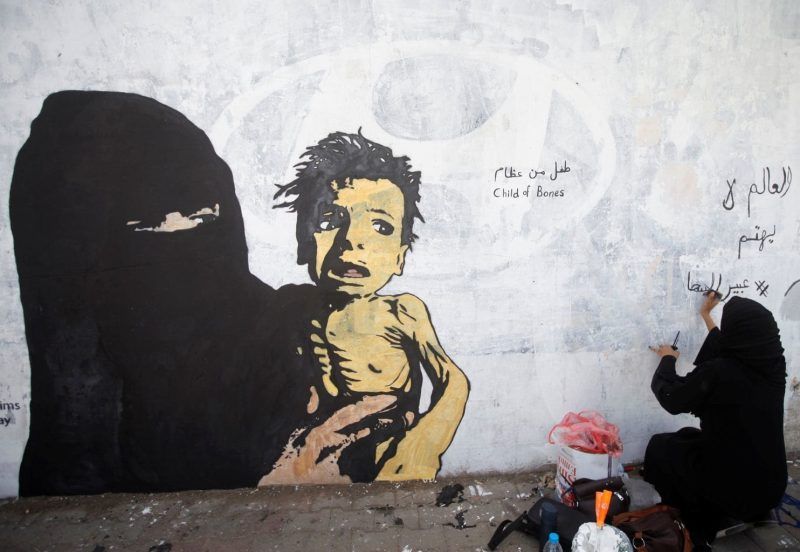
In Yemen’s brutal civil war, all parties have used tactics and strategies that amount to war crimes and crimes against humanity. Humanitarian assistance and imports of food, medicine and fuel have been blocked. Food production and distribution facilities, including markets and water wells, have been bombed. Schools, hospitals and other infrastructure essential to the survival of the civilian population have been destroyed. Political opposition figures and journalists have been arrested or tortured, or have disappeared, languishing in detention. Large numbers of land and sea mines have been put into place.
Predictably, the result has been the world’s largest humanitarian crisis, with mass starvation, outbreaks of cholera and dengue fever, and the internal displacement of millions. This devastation is man-made — with an emphasis on the word “man”. Yemeni women have every reason to want peace.
Without the necessary infrastructure and functioning government services, women are literally keeping the civilian population alive. Women and children make up 75 percent of Yemen’s internally displaced persons. To help their families survive, women walk long hours — braving areas controlled by armed men of various factions — to seek food, water, medicine and to protect their husbands and children from kidnapping, arrest and forced recruitment as fighters.
Civil society organizations, often led by women, have struggled to replace absent governmental services in education, health and assistance for the displaced and homeless. They also lead human rights and peace-building organizations such as Mwatana for Human Rights, which documents human rights abuses by all parties, and the Association of Mothers of Abductees, which has secured the release of an estimated 336 illegally detained people through public demonstrations and other efforts.
Yet the current violent conflict has seen an erosion of traditional Yemeni respect for women and girls and an increase in incidents of violence against women. This includes kidnapping and rape, street harassment and attacks by security forces. Protection services for women are now extremely limited. There are women’s shelters operating in only four governorates across the whole country, and these have limited capacity.
The failure to prioritize women’s rights is also present in international deliberations. In November, Rasha Jarhum, representative of the Women’s Solidarity Network and founder of the Peace Track Initiative, was invited to address the U.N. Security Council. She gave a powerful statement, prepared with the input of 250 Yemeni women’s organizations and individuals. It apparently fell on deaf ears, as the Security Council’s next resolution on Yemen included only an obligatory mention of the need for women’s participation in finding a political solution.
The failure by the Security Council to acknowledge, recognize and support the central role of women in Yemen’s survival during the current conflict stands in stark contrast with its earlier resolutions. In 2000, it outlined the crucial importance of women’s full and equal participation in peace-building, while in June 2017 it called “upon the parties to ensure at least 30 percent representation of women in peace negotiations” and “upon the United Nations to regularly report on consultations with women leaders and women’s organizations”.
Thanks to the determined efforts of U.N. Secretary General António Guterres, Special Envoy of the Secretary General for Yemen Martin Griffiths and their colleagues in the various United Nations humanitarian offices and agencies, women have made small inroads into the peace process. But this falls far short of an active participation by women in decision-making. Women should make up at least 30 percent of all Yemeni delegations, and women’s demands and issues should be explicitly included in negotiating agendas.
The evidence is clear: A 2018 report by the U.N. secretary general on women, peace and security states that it is critical for peace agreements to include gender-sensitive language to lay the groundwork for a gender-inclusive peace-building process and hold perpetrators of gender-based violence to account. It is therefore very disappointing to find that the words “women” or “gender” are conspicuously absent from the full text of the Stockholm Agreement from December. The words are also absent from a January U.N. Security Council resolution that establishes a special political mission to implement the Stockholm Agreement.
In the current framework, Yemeni women are effectively sidelined and justifiably concerned that their long struggle for equality — which led to progress under previous Yemen governments — could be reversed during the upcoming negotiations.
This Friday, on International Women’s Day, Yemeni women call on the international community to support them in their desire for peace. Yemeni women are qualified, willing and able to step up to the challenge of negotiating and working for sustainable peace with all. It is our country, our future and our responsibility.
Amat Alalim Alsoswa was Yemen’s first minister of human rights and served as ambassador to the Netherlands, Sweden and Denmark.
